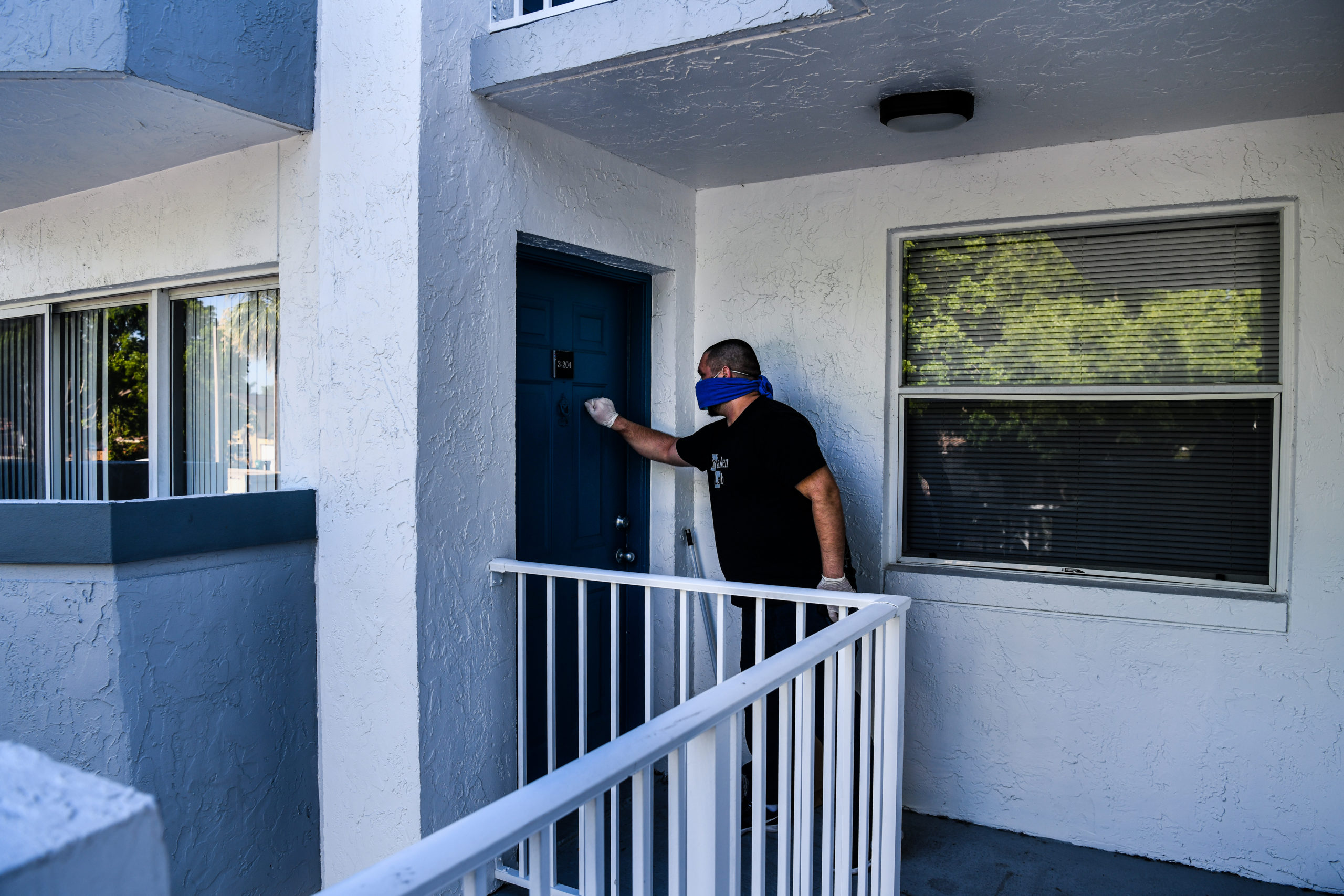Venezuelans inured to crisis show coping skills in pandemic Miami
Mario Amate, who used to work as an Uber driver and recently found himself unemployed, knocks on a door to deliver homemeade tequenos, a popular Venezuelan snack, to a customer (CHANDAN KHANNA)
Miami (AFP) – Hop into an Uber in Miami before the pandemic and it was easy to hear a driver speaking Spanish with an accent from Venezuela — many of its people ended up here after fleeing an economic meltdown back home.
Now, with the US economy largely shut down because of the COVID-19 crisis, those idle Venezuelan Uber drivers are displaying the coping skills they developed while trying to survive under President Nicolas Maduro.
Some get by as home chefs, cooking up Venezuelan dishes and marketing them on social media for people hunkering down because of the lockdown.
They are doing OK, in fact, so well they might keep cooking after the pandemic ends, whenever that is.
Mario Amate, who used to drive for the ride sharing company, recalls the day in mid-March when his phone just stopped pinging with alerts to go pick somebody up.
The United States was finally beginning to mobilize against the pandemic and Florida had shut down non-essential businesses.
“The phone did not go off once in 10 hours,” said Amate, who is 31 and settled in Miami five years ago after fleeing Venezuela’s economic, political and humanitarian crisis.
Miami, where you hear Spanish just about everywhere and Cuban exiles have contributed much to the city’s development, has become the hub of the Venezuelan diaspora in the US over the past two decades.
There are no clear estimates on how many Venezuelans moved to the US, as many of them are undocumented. According to a 2019 Pew Research Center study, 421,000 Venezuelans resided in the United States in 2017, a 352 percent increase since 2000. More than half live in Florida.
A lawyer back home, Amate has worked at just about everything in Miami. He also cooked, but 70 percent of his income came from Uber.
When his wife, an accountant, saw her hours cut in half, they started to panic.
“We were worried because we had money for a week and thought, ‘then what?'”
Amate’s neighbor Rafael Delgado, also a Venezuelan and a part-time Uber driver, was laid off from the hotel where he worked. So he proposed to Amate they start cooking and selling a Venezuelan appetizer called a tequeno — small cheese sticks wrapped in fried dough.
“We felt a lot of anxiety. But you cannot just sit back and do nothing,” said Delgado, who is 29. His wife was also furloughed so the two couples are now churning out 1,000 tequenos a week and getting by.
– ‘Times for opportunity’ –
An Uber official told AFP the company has no figures on how many of its associates are Latin American immigrants but confirmed that most of its drivers in Miami speak Spanish.
The official did not give figures for Miami but reported in March ridership nationwide was down 60 to 70 percent.
With times hard — once again, for these Venezuelans — others are cooking up dishes from back home, too.
Jesus Escalona, for instance, makes “pastichos,” a sort of Venezuelan lasagna. Manuel Freitez drives around the city delivering Venezuelan cinnamon rolls.
They are the work of his wife, a furloughed hotel chef named Natasha Echevarreneta, 30, and her father, a musician who used to earn all his income from Uber.
These hearty Venezuelans sound hopeful about their new way of surviving in exile.
“Times of crisis are times for opportunity,” said Amate.
In Venezuela, the pandemic comes with the country already an economic basketcase, amid hyperinflation and shortages of food, medicine and such basics as soap and toilet paper. Five million people have left the country to flee from all that misery in recent years.
Some former Uber drivers say that crisis steeled them for new ones.
“We have been through this,” said Delgado. “We are used to it.”
Disclaimer: Validity of the above story is for 7 Days from original date of publishing. Source: AFP.


